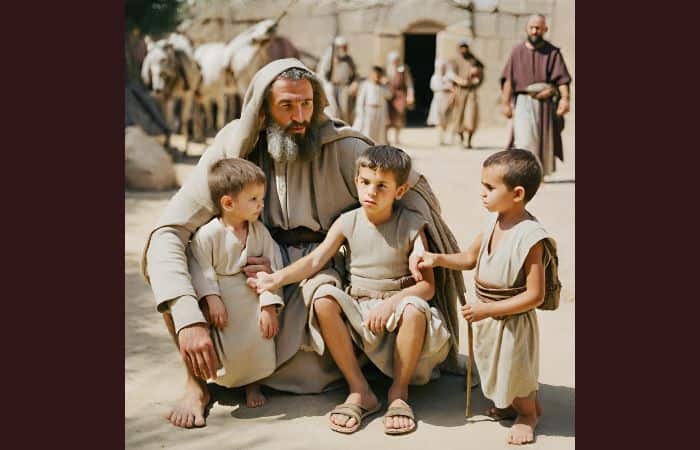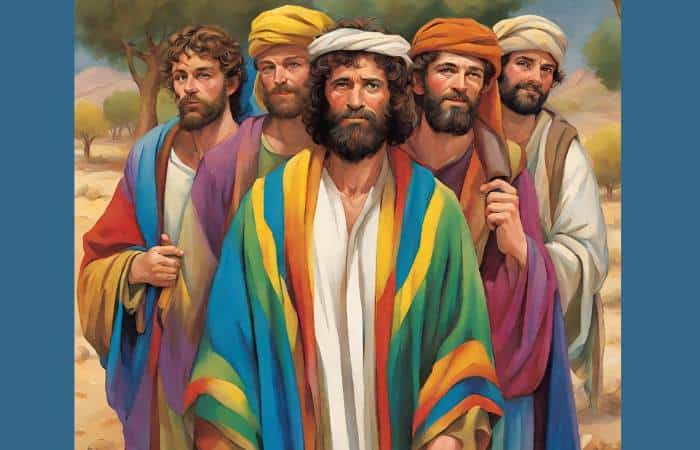Introduction
In our world today we could really use some more peacemakers, couldn’t we? Unfortunately, there are many who want to keep trouble brewing in relationships or all manner of life rather than being instruments of peace. Of course, the best examples of peacemakers are the peacemakers in the Bible.
We want to take a look at some of those, but exactly how do we label someone as a peacemaker?
What is a Peacemaker?
I think we can define a peacemaker as someone who actively seeks to resolve conflicts, brings about harmony, and helps bring reconciliation between individuals, groups of people, parties, or nations. A peacemaker would usually be characterized by their commitment to various sorts of diplomacy, non-violence, and the pursuit of peaceful solutions to disputes.
A committed peacemaker can do great things through their hard work, appealing to the reason of others, choosing the right words to be spoken, and even using the proper tone of voice.
In both a personal and societal context, a peacemaker works to create an environment where relationships can be restored, grievances can be addressed, and lasting peace can be achieved.

You can be a good example of a peacemaker in two broad categories – Personal and Societal.
1. First is when you are personally involved in one side (or sometimes both sides) of the conflict – when it is on a personal level with you and another person or group. Perhaps you are having a substantial disagreement with another person and there is a breach in the relationship. To restore the right relationship that you may want with the person you take what actions you can to be a peacemaker.
2. You also might be in a position to be a peacemaker when you are personally outside of the conflict that is occurring between individuals or groups. However, the Spirit of God may use you to work in helping mend whatever the rift or disagreement may be.
Peacemaking may involve youngsters on a playground in a disagreement all the way to those who serve as peacemakers on the world stage with nation against nation or in civil wars. An international peacemaker may attempt to broker peace between warring parties or nations.
A person with the heart of a Peacemaker sometimes succeeds and sometimes fails
Certainly, we are not always going to have an absence of conflict in our lives. Plus, if we take a stand on the word of God, it is more difficult to find common ground with those who do not seek the will of God in everyday life.
So, will there always be peace with everyone as we would like for it to be? No, not always. Although you may find that you have done everything you can to help make peace with others or help make peace on behalf of other parties, there are some difficult situations where a restored relationship is either delayed or doesn’t come at all.
However, if you seek to help restore a relationship in the way God would have you do and it fails, that doesn’t mean you were a failure, and certainly your Heavenly Father wasn’t. There are just times that the emotions involved in a conflict may take time to settle, or may never settle much at all. That doesn’t negate that you tried your best to be a peacemaker in the situation.
In those situations, a child of God should just make sure that they, themselves, have the peace of God in their own hearts that they tried to make peace in the situation. Peacemakers play a vital role in the Bible, and their examples provide valuable insights into the art of resolving conflicts and promoting harmony.
In a world often marked by strife and discord, the concept of peacemaking holds great significance for those who seek to follow the teachings of the Bible. Let’s explore various examples of peacemakers in the Bible and delve into the topic. We will take a look at some remarkable peacemakers in the Bible.

The Biblical Foundation of Peacemaking
The Bible gives us much instruction on how to be peacemakers on a larger scale and even in a simple but powerful statement as
“A soft answer turns away wrath, but grievous words stir up anger.”
Proverbs 15:1 (KJV)
A God of Peace
The Bible is a powerful source of guidance and reconciliation. If we lean into it and study the example of Jesus and His followers in the Bible we can glean the wisdom and understanding needed to navigate conflicts and promote peace.
Throughout the Bible, God is frequently referred to as the “God of peace.” We know that there have been wars, strife, and factions almost since the dawn of time. However, this is not our Heavenly Father’s goal, and one day there will be peace on earth when God, Himself, comes to reign. Peace is rooted in the very nature of God.
“And now may God, who gives us his peace, be with you all. Amen.”
“For God is not a God of disorder but of peace, as in all the meetings of God’s holy people.
Romans 15:33
1 Corinthians 14:33 (NLT)
“Keep putting into practice all you learned and received from me—everything you heard from me and saw me doing. Then the God of peace will be with you.”
Philippians 4:9 (NLT)
“Now may the God of peace make you holy in every way, and may your whole spirit and soul and body be kept blameless until our Lord Jesus Christ comes again.”
1 Thessalonians 5:23 (NLT)
Jesus was called the Prince of Peace. He came to provide peace between God and man by being the sacrifice for the sins of mankind.
However, although our God is a God of peace, a person or na ation can be the recipient of the wrath of God, He only does that because of His perfect justice. But, the very heart of God is a God of peace who wants to restore relationships, bring freedom to the captives, and bring salvation to those who will heed the words of Jesus, repent, and receive His sacrifice for their sins.
Ministry of Reconciliation
The ministry of reconciliation is quite a key theme that is found in the word of God. I think you will find that the Apostle, Paul, especially speaks of the ministry of reconciliation in his writings. In 2 Corinthians 5, Paul states,
“All this is from God, who reconciled us to himself through Christ and gave us the ministry of reconciliation.”
2 Corinthians 5:18
This ministry calls us to be ambassadors for Christ, actively working to reconcile humanity with God and with one another. As Christians, our first goal is to bring the message of reconciliation from God to the human race.
We were unworthy of reconciliation with a Holy God, but He has provided a way of salvation through the life, death, burial, and resurrection of Jesus Christ. We can bring the message of reconciliation to our family members, our friends, and our co-workers and show the world that our ultimate source of peace is through a relationship with Jesus Christ.
The Holy Spirit’s Role in Peacemaking:
One of the wonderful and extraordinary privileges of being a child of God is that we have the Holy Spirit living inside of us to lead, guide, and instruct us on our path. If we allow Him, the Holy Spirit will play an incredibly crucial role in helping believers to become effective peacemakers.
The Holy Spirit is often referred to as the “Spirit of peace.” This underscores the Spirit’s role in giving peace to the hearts of believers, and therefore, helps a believer in navigating their own conflicts and the conflicts of others.
Also, as we think about the Holy Spirit we can turn our attention to the fruit of the spirit as it is described in Galatians 5.
“But the Holy Spirit produces this kind of fruit in our lives: love, joy, peace, patience, kindness, goodness, faithfulness, gentleness, and self-control. There is no law against these things!” Galatians 5:22-24 NLT
Galatians 5:22-24 (NLT)
These qualities are essential for peacemaking, as they enable us to approach conflicts with a spirit of humility and reconciliation.
Peacemakers in the Old Testament:
Abraham and Lot
One of the earliest examples of conflict resolution in the Bible can be found in the story of Abraham and his nephew, Lot.
They were both fairly prosperous in terms of prosperity with their livestock, but there was a bit of a snag. The land that they were on wasn’t enough for them to continue with the growth of their livestock businesses. So, the men who were taking care of and working the herds started to have conflicts with one another over the matter.
Abraham the Peacemaker
So, what did Abraham do? In the face of what appeared to be a brewing conflict that was unwanted and unneeded, Abraham took the high road and unselfishly gave Lot an option. We can learn some things from this approach.
He tackled the situation head-on. Wanting to to keep the peace he offered a peacemaker’s solution to Lot:
“Finally Abram said to Lot, “Let’s not allow this conflict to come between us or our herdsmen. After all, we are close relatives! The whole countryside is open to you. Take your choice of any section of the land you want, and we will separate. If you want the land to the left, then I’ll take the land on the right. If you prefer the land on the right, then I’ll go to the left.”
Genesis 13:8-9
Then, Abraham didn’t just point out the problem; he proposed a solution. He told Lot, “Look, there’s a whole lot of land around us. Why don’t we split it up? You choose whichever direction you want to go, left or right, and I’ll take the opposite.”
So, what was the end result? Lot snagged the prime real estate and Abram ended up with the less glamorous land. But Abram had made an unselfish decision that avoided a family feud!
Abraham, guided by his faith in God and his desire for peace, chose to keep the peace and offered Lot a generous solution. This act of selflessness and peacemaking sets an early example of a peacemaker.
Joseph and His Brothers
It would take pages and pages to tell the compelling story of Joseph. The entire epic story of Joseph is one that I would encourage you to read at some point – several times. It begins in Genesis chapter 37 and ends in Genesis chapter 50.
It’s one of the most interesting and fascinating series of events in the Old Testament. And the story of Joseph and his brothers is another powerful illustration of peacemaking.
You might remember that Joseph’s brothers had betrayed him and actually sold him into slavery because of their jealousy. However, many years later when Joseph was in a great position of wealth and power an opportunity arose for him to forgive his brothers and help them out in a time of great need. He did so with great love and grace and was an extraordinary peacemaker.
Joseph chose to forgive and embrace his brothers, exemplifying the transformative power of forgiveness and the process of peacemaking.
Moses: Resolving Conflicts in the Exodus

Moses, who wrote the first five books of the Bible and was a central figure in the Old Testament, played a crucial role in resolving conflicts among the Israelites during their journey out of Egypt and through the wilderness.
From mediating disputes among the people to interceding on their behalf before God, Moses exhibited the qualities of a peacemaker throughout the Exodus narrative. One in particular is found in Exodus, chapter 32.
You might remember that Mose had gone up to Mount Sinai to hear from God and receive the Ten Commandments. Since he was gone an extended amount of time (40 days and 40 nights) the Israelites grew restless and wondered what had happened to Moses.
They asked Aaron about making some gods who could lead them. If you recall they melted down their gold and molded in the form of a golden calf.
Well, the Lord was really angry. He was angry enough that He told Moses that He would just destroy the idol-worshipping Israelites and make another nation for Moses to lead. When Moses realized the severity of the sins of the Israelites and how they had angered God, he tried and was successful in being a peacemaker.
“But Moses tried to pacify the Lord his God. “O Lord!” he said. “Why are you so angry with your own people whom you brought from the land of Egypt with such great power and such a strong hand? Why let the Egyptians say, ‘Their God rescued them with the evil intention of slaughtering them in the mountains and wiping them from the face of the earth’? Turn away from your fierce anger. Change your mind about this terrible disaster you have threatened against your people! Remember your servants Abraham, Isaac, and Jacob.
You bound yourself with an oath to them, saying, ‘I will make your descendants as numerous as the stars of heaven. And I will give them all this land that I have promised to your descendants, and they will possess it forever.’” So the Lord changed his mind about the terrible disaster he had threatened to bring on his people.”
Exodus 32:11-14
This event served as an affirmation of Moses’ leadership and a reminder of the importance of seeking peaceful resolutions even in times of conflict.
King Saul and David
The complex relationship between King Saul and David offers valuable insights into the challenges of peacemaking, including dealing with jealousy and rivalry. Despite Saul’s jealousy of David’s popularity and pursuit of David, David consistently sought to maintain a posture of respect and reconciliation.
Although Saul had multiple attempts to kill David, also David had numerous chances to take Saul’s life. However, David did not take the opportunity to kill Saul and he showed a willingness to reconcile with the King.
Old Testament Prophets as Peacemakers
Let us also not forget some of the great Old Testament Prophets who had God’s favor in their lives such as Isaiah and Jeremiah. They served as messengers of peace and called for repentance and reconciliation with God.
The messages of the Old Testament prophets often addressed conflicts or sins within the nation of Israel, and they urged them to turn away from their sinful ways and be reconciled to God.
This shows that sometimes a peacemaker may be put in the position of telling people some hard truths that are for their own good. That certainly applies to our culture today. True peace can be gained by capitulating to evil. We must stand on God’s word and His promises and principles.
However, it should be done with love, a passion for pleasing God, and doing what is right in his sight.
The Prince of Peace: Jesus Christ, The Son of God
The Ultimate of Peacemakers In the Bible
Jesus Christ is often referred to as the “Prince of Peace,” and His life and teachings serve as the ultimate example of peacemaking. He came into the world to bring reconciliation between humanity and God. His ministry was marked by acts of compassion, forgiveness, and love. Jesus would be the greatest example of a peacemaker as he gave the ultimate sacrifice to bring peace between God and mankind.
The incredible and world-changing life of Jesus brought the good news, the Gospel message to men, women, boys, and girls to give them a life of peace and to make a way for them to have eternal peace in Heaven.
Lessons from Jesus’ Life:
Here are just a few more examples of being a peacemaker from the life of Jesus.
The Seventh Beatitude: In the Sermon on the Mount, Jesus proclaimed,
“Blessed are the peacemakers, for they will be called children of God.”
Matthew 5:9 (NIV).
This beatitude highlights the significance of peacemaking in the life of a believer and the promise of being recognized as children of God.
Jesus’ Teachings on Conflict Resolution: In Matthew 18:15-17, Jesus provided practical guidance for resolving conflicts within the Christian community. He emphasized the importance of addressing issues directly, seeking reconciliation, and involving the church community when necessary.
Jesus’ Example of Forgiveness: The most profound and extraordinary example of being a person who delivers a way of peace was Jesus’ forgiveness on the cross. As He hung crucified, He prayed, “Father, forgive them, for they do not know what they are doing” (Luke 23:34a), exemplifying the ultimate act of reconciliation and forgiveness.
What he did on the cross made the way for all who choose Him to have a life of peace, even if earthly battles are still raging, His ultimate peace will not be defeated.
Apostle Paul: A Prominent Peacemaker:
Other than Jesus Christ himself, perhaps the Apostle Paul is the most influential Christian in the Bible or in history. He was a prominent figure in the New Testament and played a significant role in promoting reconciliation and unity among believers.
His letters contain powerful teachings on the subject of peacemaking, and his own life serves as a model of dedication to this ministry.
- Paul’s Letters on Reconciliation: In his letters, such as Ephesians and Colossians, Paul emphasizes the importance of unity and reconciliation among believers. He encourages them to bear with one another in love and to maintain the bond of peace.
- Paul’s Ministry of Reconciliation: In Paul’s letter to the church in Corinth in 2 Corinthians 5:18, He emphasizes that God has given believers the “ministry of reconciliation.” He urges believers to be ambassadors for Christ, imploring others to be reconciled to God.
Believers as Peacemakers:
As followers of Christ, believers are called to be peacemakers in their own communities and within the body of believers. We may find that we have opportunities in our homes with our families, in our churches, or wherever the Lord may open the door for us as a peacemaker.
The unity of the Spirit, as discussed in Ephesians 4:3, is a goal that believers should strive to achieve, working together in love and humility to maintain peace and harmony.
Make every effort to keep the unity of the Spirit through the bond of peace.
Ephesians 4:3
The Challenges of Peacemaking:
Dealing with Difficult People:
One of the most significant challenges in peacemaking is dealing with difficult people. Let’s not sugarcoat it. Some people have personality traits that are difficult to deal with. They may be Christians and want to serve Jesus and the body of Christ. However, they may be argumentative and angry about a topic.

However, there are personality types that can be hard to deal with in various situations. So, it’s great that the Bible provides numerous examples and principles for handling difficult people with grace and wisdom.
- Turn the Other Cheek (Matthew 5:39) The Bible encourages us to respond to difficult people with grace by turning the other cheek, as taught by Jesus in the Sermon on the Mount. This principle promotes non-retaliation and a spirit of forgiveness. Does this mean that there are no “just wars” and that countries cannot defend themselves by retaliation? No, it doesn’t. However, it is a principle that we should apply when appropriate
- Love Your Enemies (Matthew 5:44): Another teaching from Jesus emphasizes loving your enemies and praying for those who mistreat you. This demonstrates grace and compassion even in the face of hostility. Is it hard to love our enemies and pray for them? Yes, but we can do it in the power of the Holy Spirit.
- Overcome Evil with Good (Romans 12:21): The Bible instructs us to overcome evil with good. This principle encourages responding to difficult people with wisdom and grace, striving to bring about reconciliation rather than perpetuating conflict.
The key to being a peacemaker is to do as we mentioned earlier. Ask the Holy Spirit to work in and through you to deal with the person who is causing the difficulty. Ask the Holy Spirit to help you understand the person, the group, and the issue at hand.
Sometimes when the Holy Spirit gives us a glimpse of what an individual or group might be dealing with in their own life, we may find a reason for the behavior of a person. It might not be a good reason or one that would at all justify the behavior. However, it may give you an understanding in knowing how to navigate the problem.
Trust in the Spirit to guide you.
Conclusion
The examples of peacemakers in the Bible provide invaluable guidance on the importance of peacemaking in the lives of believers. As children of God and followers of the Lord Jesus Christ, we are called to be instruments of peace in a world often marked by conflict.
Embracing the spirit of peace, forgiveness, and reconciliation, we can fulfill the seventh beatitude and work towards the ultimate goal of fostering harmony and unity among God’s people. May the lessons from these biblical examples inspire and guide us in our journey as peacemakers in a world that longs for the healing touch of God’s peace.





Leave a Reply